新概念2 Lesson_3_Please_send_me_a_card共71页PPT资料
(最新版) 新概念英语第二册Lesson---3--Please-send-me-a-card
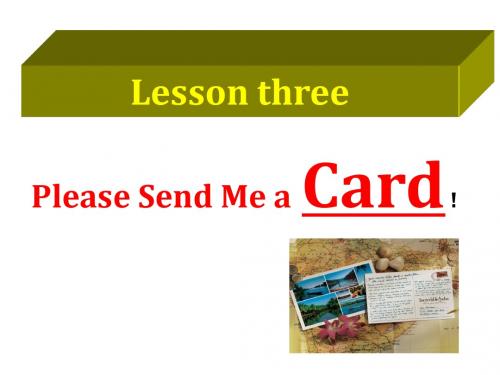
• Spare the rod and spoil the child.
6. friendly adj. 友好的
• He is friendly to us all.
• be friendly to • be rude to
• lovely • lonely
7. public adj. 公共的
• public school • public garden=park
4. lend (lent, lent) v. 借给
• Can you lend me that book?=
• Can you lend that book to me?
• lend sb.sth. = • lend sth.to sb
borrow …from…
• Tom borrowed a book from his teacher0 from a friend.
• single adj. 唯一的, 单一的
Fill in the blanks.
lend 1. I forgot to take my pen. Can you ________ me yours?
2. A lot of people will come to China in 2022. friendly to We Chinese people should be _____________ them.
Lesson three
Please Send Me a
Card
!
1. postcard n. 明信片
• postman
• ID card
• Christmas card • 圣诞贺卡
credit card 信用卡
新概念英语第二册第三课笔记
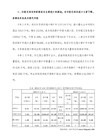
I spend my weekend at my mother's.
I spend three hours in the classroom everyday.
I spend a lot of time in traffic jam.(N5X^X)
7 He spent the whole day in his room. He was in his room ______ day.
a.the hole b.the all c.all d.all of
send/take children to school
:S+R : take : :_ЧNN; take flowers to his wife ]
sendR/f,{ NNS, Y桨f send flowers to his wife ^vN
postcard n. fr
[謏a]/t/T/k/MR1YSr4x獀
Ne, @b厁(ua little Italianba few words of Italian
I can speak a little English/a few words of English
think about/of Q, `, think ofc
think over:Q
3.The writer brought the man a bottle of beer.
(W奸^u;m-N, x0RqN : Can I buy you a bottle of beer ? a:NbUogRvi
What do you think of?
What do you think of the weather today? `O_)Yl`HN7h?
新概念英语第二册第三课讲解

Lesson 3 Please send me a card请给我寄一张明信片Postcards always spoil my holidays. Last summer, I went to Italy. I visited museums and sat in public gardens. A friendly waiter taught me a few words of Italian. Then he lent me a book. I read a few lines, but I did not understand a word. Everyday I thought about postcards. My holidays passed quickly, but I did not send cards to my friends. On the last day I made a big decision. I got up early and bought thirty-seven cards. I spent the whole day in my room, but I did not write a single card!New words and expressions 生词和短语send v. 寄,送 postcard n. 明信片 spoil v. 使索然无味,损坏museum n. 博物馆public adj. 公共的friendly adj. 友好的waiter n. 服务员,招待员lend v. 借给decision n. 决定whole adj. 整个的single adj. 唯一的,单一的参考译文明信片总搅得我假日不得安宁。
去年夏天,我去了意大利。
我参观了博物馆,还去了公园。
一位好客的服务员教了我几句意大利语,之后还借给我一本书。
我读了几行,但一个字也不懂。
新概念英语第二册 Lesson 3 Please send me a card
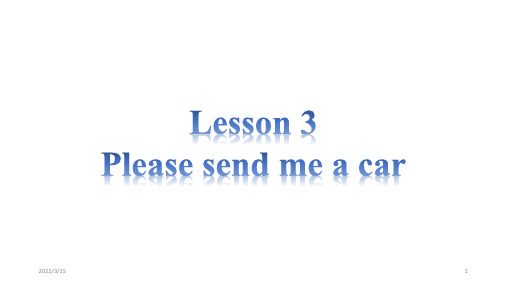
2022/3/15
7
Please send me a card Postcards always spoil my holidays.
postcard /'pəʊs(t)kɑːd/ n. 明信片 holiday /'hɒlɪdeɪ/ n. 假期 spoil /spɒɪl/ vt. 毁坏;破坏 破坏掉一天 破坏掉一个机会 破坏兴致;扫兴
2022/3/15
9Exercise: Nhomakorabea1.我的假期总是被坏天气破坏掉。
2.我不想扫你的兴。
3.那些高楼大厦破坏了这一带的景致。
2022/3/15
10
Exercise:
1.我的假期总是被坏天气破坏掉。 Bad weather always spoils my holidays.
2.我不想扫你的兴。 I wouldn't want to spoil your fun.
2022/3/15
14
Please send me a card
Postcards always spoil my holidays. Last summer, I went to Italy. I visited museums and sat in public gardens. A friendly waiter taught me a few words of Italian.
1.---How far is it? ---
. (只有几千米。)
2.我会说一点英语。
.
3.
. Hurry up! (时间不多了。快点!)
4.There is
in the Thermos.
保温瓶里还有点儿水。
2022/3/15
新概念第二册第3课-Please-send-me-a-card-PPT

链接新目标
send /send/
八上U3-SA 3a-P15
1)send sth. to sb. / send sb. sth
send a letter 寄信 八上U3-SA
类似的用法还有 give, take, pass, read, sell... 3a-P15
2)send / take children to school
I read a few lines,but I did not understand a word.Every day I thought about postcards. think about 考虑,思考 例如:Are you still thinking about
the movie?
think of 考虑,想起 例如:What do you think of my new car?
think over 仔细考虑 例如:Please thinke over what I’ve said.
think out 想出,想通 例如:At last we thought out the answer of the question.
A friendly waiter taught me a few words of Italian.Then he lent me a book.
• decide / make up one’d mind 区别 • decide 指经过考虑对疑难问题、争端等做出决断,含有下决
心取舍的意思。Decide 后常 • 接动词不定式和从句。 • 例如:Te a sailor.
• They couldn’t decide what they should do next. • make up one’s mind 指毫不犹豫的做出决定,意味着“打定
新概念二册 lesson 3 please send me a card

Please send me a card. 请给我寄一张明信片
★ send /send/ v. 寄,送
1. send – sent – sent 寄一封信/卡片/电子邮 send a letter/ card / an e-mail
• send sb sth = send sth to sb 送/寄给 某物给某人 她寄给我一张圣诞卡片。 She sent me a Christmas card. =She sent a Christmas card to me.
★ single adj. 唯一的,单一的
反义词:double adj 两倍的,双重 的
Q: 1. What can you see in the picture?
2. How many cards did he buy? 3. Where did he go ?
Postcards always spoil my holidays.
12. I bought you this bunch of flowers. 13. Bring me that book, please. 14. He offered a cigarette to me. 15. Read the first paragraph for me.
16. I’ve ordered you some soup. 17. I owe a lot of money to him. 18. Pass your father the mustard.
I spent the whole day in my room, but I did not write a single card!
1. spend – spent – spent 花费,消费 sb spend some time (in) doing sth 花费某人多长时间去做某事= =It taks sb some time to do sth 我花费了两个小时时间玩电脑游戏。 I spend two hours in playing computer games. =It takes me two hours to play computer games.
新概念英语第二册课文内容及翻译lesson 3 Please send me a card.doc

新概念英语第二册课文内容及翻译lesson 3 Pleasesend me a cardPostcards always spoil1 my holidays. Last summer, I went to Italy. I visited museums and sat in public gardens. Afriendly waiter taught me a few words of Italian. Then helent me a book. I read a few lines, but I did not understand a word. Every day I thought about postcards. My holidays passed quickly, but I did not send cards to my friends. On the last day I made a big decision. I got up early and bought thirty-seven cards. I spent the whole day in my room, but I did not write a single card!Notes on the text 课文注释1 a few words,几句话。
2 lent me a book中,lent是“借出”的意思。
我们常说lend sb.sth.或lend sth.to sb.。
borrow是“借入”的意思,常用的结构是borrow sth.或borrow sth.from sb。
参考译文明信片总搅得我假日不得安宁。
去年夏天,我去了意大利。
我参观了博物馆,还去了公园。
一位好客的服务员教了我几句意大利语,之后还借给我一本书。
我读了几行,但一个字也不懂。
我每天都想着明信片的事。
假期过得真快,可我还没有给我的朋友们寄过一张明信片。
新概念英语二lesson3 Please send me a card

• Postcards always spoil my holidays.
• Last summer, I went to Italy. I visited museums and sat in public gardens.
• A friendly waiter taught me a few words of Italian.
He brought his son a present.
He brought a present for his son.
一般过去时。定义动词的过去式: • 表示过去某个特定时间或某一段时间发生的 •动作或情况。 ► We visited the school last spring. ► I went to school by bike when I was in middle school. ► China was founded in 1949.
n. 明信片
eg. Every year I can receive some postcards.
name card /visiting card 名片
eg. Here is my name card.
ID card 身份证
credit card 信用卡
cash card 现金卡, 储蓄卡, 工资卡
有时,间接宾语也可改为由介词to或for引起 的短语,放在直接宾语的后面。
一般简介宾语置于直接宾语之前,一旦简 介宾语置于直接宾语之后,间接宾语前要加 to或for来表达。To表示动作对谁所做,表 示方向性;for表示为了谁所做,是目的性。
He lent me a book.
He lent a book to me.
Lesson 3
逐句精讲新概念英语第二册:第三课请给我寄一张明信片

Lesson 3 Please send me a card 课⽂内容: Postcards always spoil my holidays. Last summer, I went to Italy. I visited museums and sat in public gardens. A friendly waiter taught me a few words of Italian. Then he lent me a book. I read a few lines, but I did not understand a word. Everyday I thought about postcards. My holidays passed quickly, but I did not send cards to my friends. On the last day I made a big decision. I got up early and bought thirty-seven cards. I spent the whole day in my room, but I did not write a single card! 本⽂语法:双宾语 宾语主要分为两⼤类:直接宾语和间接宾语。
语法归纳:句⼦中的谓语动词后经常加两个宾语,直接宾语为动作的转载者,⼀般为⼈;直接宾语表⽰动作的真正承受者或结果,⼀般为物。
直接宾语和间接宾语可以互相交换位置,⼆者之间常⽤介词to或for进⾏连接。
to表⽰⽅向,对象,for表⽰⽬的。
例如: 标题:Please send me a card 请寄给我⼀张明信⽚。
语⾔点典型双宾语⽤法:me为间接宾语,a card为直接宾语。
此句可以改为:Please send a card to me. 逐句精讲: 1.Postcards always spoil my holidays. 明信⽚总是搅得我假⽇不得安宁。
新概念2Lesson3PleaseSend Me a Card请给我寄一张名片 教研版
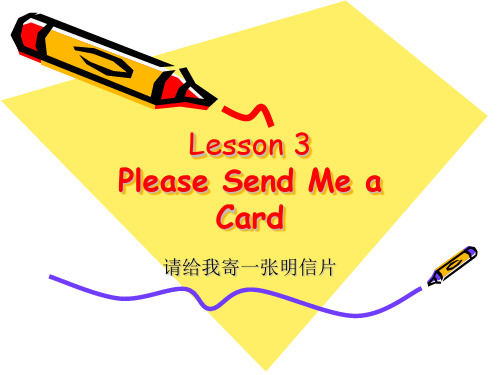
2、A friendly waiter taught me a few words of Italian. teach sb. sth. 教某人做某事 He teaches us English.(对) 语言不可数 a little Italian或a few words of Italian I can speak a little English/a few words of English.
1
adj. 友好的 n. 服务员 v. 借给
2
decision 3
4
5
n.决定 adj 整个的
adj. 唯一的,单一的
【Key words and expressions】
1.send v. 寄, 送 send a letter 寄信 send sth. to sb. /send sb. sth. 给某人送(寄)什么东西
7. lend v. 借给 lend to(借出): lend sth. to sb/lend sb. sth.
borrow from(借进):
borrow sth. from sb./borrow sth.
(borrow不能用 borrow sb sth.)
He borrowed my pen yesterday.
catch teach find get stand understand understood go do
caught taught found got stood went did
规则动词过去式-ed的发音
1.在以清辅音结尾的规则动词后, -ed读作/ t / worked 2.在以浊辅音或元音结尾的规则动词后 , -ed读作/d / play ed
新概念2 Lesson_3_Please_send_me_a_card

New words and expressions
friendly adj. waiter n. lend v. whole adj. single adj. 友好的 服务员 借给 整个的 唯一的,单一的
词组
New words and expressions
1. send sth. to sb. send a letter to sb. send children to school =take children to school 2.send sb. sth. send sb. a letter
Kiki SHEN 81 XX Street XX Road Wuxi City, J.S. Province
Key structure
1.带有确定的过去时间状语时,要用过去时
如:yesterday(昨天)、two days ago…(两 天前…… )、last year…(去年…)、the other day(前几天)、once upon a time(过去曾经)、 just now(刚才)、in the old days(过去的日子 里)、before liberation(解放前…)、 When I was 8 years old(当我八岁时…)、at+一个时间点
Language point
Italy [ 'i t ə l i ] n. 意大利 重音 在第一个音节上 Italian[ i 't æ l jə n ] adj. 意大利的 重音在第二个音节上 引申: Canada/Canadian 加拿大
Language point
比较下列用法: He lends me a pen./ He lends a pen to me. I borrow a pen from him.
Lesson 3 Please send me a card(课件)新概念英语第二册

Please send me a card. 请给我寄一张明信片
Lesson 3 Please send me a card
Learning objectives: • Be able to listen and comprehend the text • Be able to make sentences with the new • words and phrases • Be able to retell and do summary writing • Be able to use the direct objects and indirect • objects after verbs
postcard
Did you make a dicision to send a postcard to your friend?
be friendly to sb. send a postcard to sb. make a decision to do sth. do sth. in public
Let's put them together and beautify it .
Postcards always spoil the winter’s holiday. Last summer, he spent his holidays in Italy. And he thought about postcards every day. Because He didn’t send any cards to his friends. He bought 37 cards on the last day. And he stayed in his room all day. But he didn’t write any cards.
新概念II lesson 3 please send me a postcard

Homework: 1、背诵lesson 3; 2、生词3+1
Байду номын сангаас
写出课文中出现的动词过去式原形 go 1. went _______ visit 2. visited _______ sit 3. sat _______ teach 4. taught ______ lend 5. lent _______ read 6. read _______ think 7. thought _______ pass 8. passed _______ send 9. sent _______ 10. made _______ make get 11. got ______ buy 12. bought _______ 13. spent _______ spend write 14. wrote _______
*寄,送(信件、邮包等) send sth. to sb.=send sb. sth.把某物寄给某人
Postcards always spoil my holidays.
2、 postcard [pəustka:d] n. 明信片 3、 spoil [spɔil] (spoiled or spoilt) v. 损坏,弄坏 last: adj. 上一个 4、 Italy [‘itəli] n. 意大利(欧洲南部国家)
9、 lend [lend] (lent [lent], lent)把……借给,借出
teach sb. sth. 教某人做某事
I read a few lines, but I did not understand a word.
a few[fju:]可与复数可数名词连用,表示肯定:一些,少数几个。 a little['litl] 可与不可数名词连用,表示肯定:一些,a little water
新概念英语第二册第三课Please send me a card
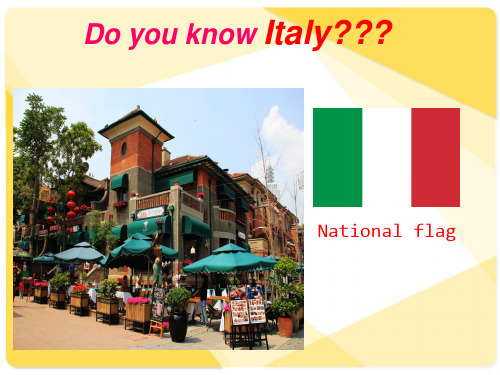
谓语构成
一般过去时的谓语构成:由动词 的过去式构成(参看书本)
规则变化
1.一般加ed work — worked 2.以e结尾加d change — changed 3.末尾只有一个辅音字母的重读闭 音节词,先双写这个辅音字母,再 加ed . stop — stopped
Do you know Italy???
National flag
Crazy for ancient culture?
Wow! Rome (Capital) is your best choice!
All roads to Rome.
古罗马斗兽场
Crazy for water and carnival?
一般过去时态
什么是一般过去时?
动词的一般过去时态表示过去发生的 动作、情况或存在的状态。 行为动词(即实义动词)的过去式没有人称 和数的变化。
所有时态都是通过
动词
变化来表现的
用于一般过去时的时间状语
1.时间状语+ago 连用
ቤተ መጻሕፍቲ ባይዱ
st +时间状语 3.yesterday+时间状语 4.one +时间状语 5.that +时间状语
Words & Phrases ★send v.寄,送
send sth. to sb. /send sb. sth. 给某人送 (寄)什么东西 send/take children to school send a letter 寄信
take和send 的区别:
take强调某人亲自送 send则是通过第三人去送,如校车 take flowers to his wife (自己送 ) send flowers to his wife (叫店员送) 类似的用法还有give,take,pass,sell, show,lend.....
新概念英语第二册Lesson3pleasesendmeacard课件
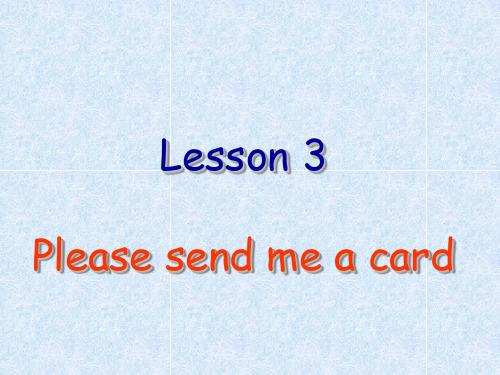
假期过得真快,可我还没有给我的朋友们寄过一张明信片。
My holidays passed quickly,
but I did not send cards to my friends.
到了最后一天,我作出了一项重大决定。
On the last day, I made a big decision.
• 1.send sb. sth= send sth. to sb.
• 2. lend sb. sth.= lend sth. to sb.
• 3. spend v. 花费(人做主语) spend+time/money+ on sth.
•
(in) doing sth.
• 4. make a decision 做决定
Lesson 3 Please send me a card
Beautiful Sentence
• To the world you may be one person, but to one person you may be the world.
• 对于世界而言,你是一个人;但 是对于某个人,你是他/她的整个 世界。
2 WWhhaattdbidigthdecyisdionafdtiedr the mwreiatle?r make? He got up early and bought thirty-seven cards.
3 W ?Honohwathtmehaalnapysptecndaeraddys?inditdhethmeidwdrlieteorf sthenednight He did not write/send a single card.
新概念英语2(L3 Please send me a card) 思维导图视觉笔记

新概念英语2Lesson 3 Please send me a postcard 一、老师讲解(思维导图)二、背诵原文(4宫格漫画)三、笔记精讲(词汇句型)1、postcard /'poust.kard/ (n.) 明信片eg. blackboard黒板= black + board / raincoat雨衣= rain + coat2、send /send/(v.)寄,送(send sent sent)请代我问候你的爸妈。
)lend an ear聆听,倾听eg. Claire's always the one to lend an ear if I have problems.3、friendly /'frendli/ (adj.)友好的manly voice具有男子气概的声音/ womanly charm女性魅力/ brotherly兄弟般的/ sisterly姐妹般的eg. He has such a manly voice. / She used her womanly charm to persuade him to change his mind.4a hasty decision一个轻率的决定(含贬义) / hasty轻率的,匆忙的,草率的a snap decision一个仓促的决定/ snap匆忙的,不加思索的5、spoil /sp51I/ (v.)破坏,糟蹋,毁掉; (使) (食物)变质,(使)变坏宠爱eg. Please don't spoil all this fun.不要把这些乐趣给毁掉了。
spoil(v.)破坏,糟蹋,毁掉eg. spoil sb's party使(某人)败兴,扫(某人)的兴spoil(v.)宠爱;溺爱spoil sb rotten惯坏某人。
eg. The children are spoiled rotten by their grandparents.6、visit (v.)/(n.)参观,游览,拜访pay a visit to (someplace)参观(某处)eg. We paid a visit to a very famous museum while we were in ltaly.= We visited a very famous museum while we were in Italy.7、then (adv.)1). then然后,接着,这个用法一般有前文相照应eg. He thought a bit and then answered. / Give her the letter to read, then she'll understand.2). then在当时,在那时eg. I was working in the city.3). then这么说来,那么,既然如此eg. Then you must be my cousin.8、every day & everydayevery day每天,一般在句中做的成分为时间状语eg. I go to school every day.everyday日常的,通常的,普通的9、spend花(时间),度过(spend spent spent)spend +一段时间+ doing sth花时间做某事eg. I spent a lot of time cleaning that room.spend +多少钱+ on sth在...方面花钱eg. She spends a lot of money on clothes.四、笔记精讲(语法)一般过去时通常表示过去发生的而现在已经结束的事件、动作或情况。
Lesson3PleaseSendMeACard讲义-高中英语新概念第二册(1)
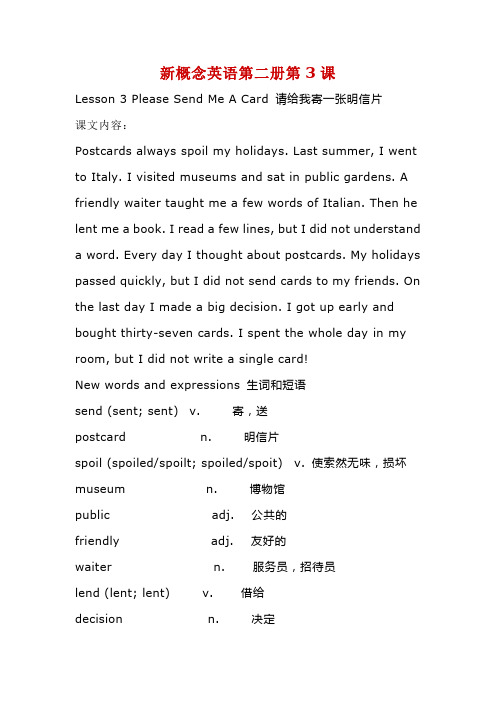
新概念英语第二册第3课Lesson 3 Please Send Me A Card 请给我寄一张明信片课文内容:Postcards always spoil my holidays. Last summer, I went to Italy. I visited museums and sat in public gardens. A friendly waiter taught me a few words of Italian. Then he lent me a book. I read a few lines, but I did not understand a word. Every day I thought about postcards. My holidays passed quickly, but I did not send cards to my friends. On the last day I made a big decision. I got up early and bought thirty-seven cards. I spent the whole day in my room, but I did not write a single card!New words and expressions 生词和短语send (sent; sent) v. 寄,送postcard n. 明信片spoil (spoiled/spoilt; spoiled/spoit) v. 使索然无味,损坏museum n. 博物馆public adj. 公共的friendly adj. 友好的waiter n. 服务员,招待员lend (lent; lent) v. 借给decision n. 决定whole adj. 整个的single adj. 唯一的,单一的参考译文明信片总搅得我假日不得安宁。
新概念英语第二册+Lesson+3+Please+send+me+a+card+知识点
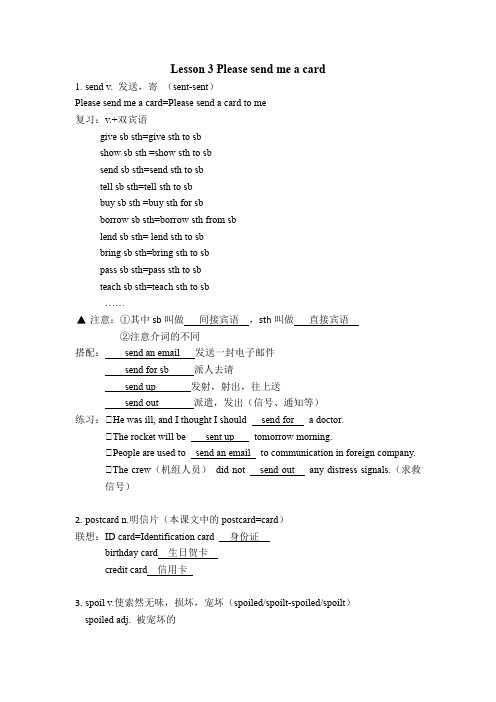
Lesson 3 Please send me a card1.send v. 发送,寄(sent-sent)Please send me a card=Please send a card to me复习:v.+双宾语give sb sth=give sth to sbshow sb sth =show sth to sbsend sb sth=send sth to sbtell sb sth=tell sth to sbbuy sb sth =buy sth for sbborrow sb sth=borrow sth from sblend sb sth= lend sth to sbbring sb sth=bring sth to sbpass sb sth=pass sth to sbteach sb sth=teach sth to sb……注意:①其中sb叫做间接宾语,sth叫做直接宾语②注意介词的不同搭配:send an email 发送一封电子邮件send for sb 派人去请send up 发射,射出,往上送send out 派遣,发出(信号、通知等)练习:①He was ill, and I thought I should send for a doctor.①The rocket will be sent up tomorrow morning.①People are used to send an email to communication in foreign company.①The crew(机组人员)did not send out any distress signals.(求救信号)2.postcard n.明信片(本课文中的postcard=card)联想:ID card=Identification card 身份证birthday card 生日贺卡credit card 信用卡3.spoil v.使索然无味,损坏,宠坏(spoiled/spoilt-spoiled/spoilt)spoiled adj. 被宠坏的注意:在英文中,现在分词(v-ing)和过去分词(done)可以作adj.修饰名词例:an interesting book一本有趣的书boiled water开水运用:Heavy rain has spoiled/spoilt my holiday.(动词过去分词)That spoiled boy always asks for everything.(过去分词作形容词)辨析:表示“损坏”的单词spoil damage destroy breakspoil 表示破坏心情,宠坏damage 强调损害后还可以修复destroy 强调损坏之后不能修复,彻底破坏break 强调“打破,打碎”练习:①After the air crash, the plane has been destroyed .①One of the visitors damaged our piano, and my dad would have it repaired.①Much homework will spoil my weekend.①Don’t break the vase.4.museum n.博物馆搭配:science museum 科学博物馆art museum 艺术博物馆history museum 历史博物馆5.friendly adj. 友好的;友善的联想:unfriendly 不友好的;不友善的friend 朋友friendship友谊运用:A friendly waiter taught me a few words of Italian.复习:n.+ly →adj.day→daily 日常的week→weekly 每周的year→yearly 每年的6.waiter n.服务员,招待员联想:waitress n.女服务员actor n.男演员/actress n.女演员host n.男主人,男主持人/hostess n.女主人,女主持人7.lend v.借给,借出(lent-lent)搭配:lend sb sth=lend sth to sb运用:He lent me a book.= He lent a book me .辨析:lend和borrowlend 表示借出去,句式是lend sb sth = lend sth to sbborrow 表示借进来,借入,句式是borrow sb sth=borrow sth from sb运用:He wanted to borrow money from me, but I didn’t lend it to him. (他想借钱,但是我没借给他)8.decision n.决定搭配:make a decision to do sth决定做某事例句:I make a decision to study hard. 我下定决心努力学习词根:decide v.决定(decided-decided)decide to do sth决定做某事例句:He decided to give me a hand.拓展:make up one’s mind to do sth.例句:Mr. Wang made up his mind to give up smoking.9.whole adj. 整个的搭配:the whole day=all the day=all day 一整天运用:the whole world 整个世界同音词:hole 洞,孔例句:He fell down the hole with carelessness.运用:dig a hole 挖洞10.single adj.唯一的,单一的,单身的搭配:single room 单人房联想:double adj.双的double room 双人房married adj. 已婚的运用:Are you single or married?I did nor even write a single card.我甚至一张卡片都没有写出来11.line n. 行,也可以表示路线,队列例句:I am repairing your telephone line. 我在修理你的电话线.The line is busy. 线路很忙Stand in the line. 排队12.a few, few, a little, little的用法①a few / few 后+ 可数名词a few 表示“有几个”,表达肯定含义few 表示“几乎没有”,表达否定含义(相当于no)②a little / little 后+ 不可数名词a little 表示“少量”,表达肯定含义little表示“几乎没有”,表达否定含义(相当于no)练习:① There are a few books in the box, and I will take out one to read.① The milk smells spoiled, and I will go to the market to buy a little .① There is a little/little water in the bottles.13.think v. 思考,考虑(thought-thought)think of vs think aboutthink of 想到,考虑,侧重于想起来,记起来think about 考虑,思索,侧重于认真思考,思索练习:①Think about it before you give your idea.①I know that guy, but I just can’t think of his name.14.on the last day 在最后一天on the first day 在第一天具体某一天用介词on练习:① in spring① on a cool autumn night① at noon/night① in June, 2004① on 1st June, 2024① on holiday15.spend v.(spent-spent)花费,度过搭配:spend sth 花费……(spend money 花钱)spend time/money on sthspend time/money (in) doing sth练习:He spends half an hour on English each day.He spends half an hour (in) learning (learn) English each day.16.时态复习:一般过去时一、定义:一般过去时用来表示过去某一时间内发生的动作或存在的状态以及过去习惯性、反复性的动作二、动词构成:was/were 或者动词过去式※注意:复习背诵动词过去式不规则变化表三、句型转换1.be动词的变化肯定句:主语+was/were+其他否定句:主语+was/were+not+其他+?一般疑问句:Was/Were+主语+其他+?特殊疑问句:特殊疑问词+was/were+主语+其他+?2.行为动词的变化肯定句:主语+动词过去式+其他否定句:主语+didn’t+动词原型+其他一般疑问句:Did+主语+动词原型+其他+?特殊疑问句:特殊疑问词+did+主语+动词原型+其他+?四、连用的时间状语yesterday, the day before yesterday, last+时间,时间+ago, just now, in 1990, at the age of ...,When I was 8...,this morning, that day, in those days等。
